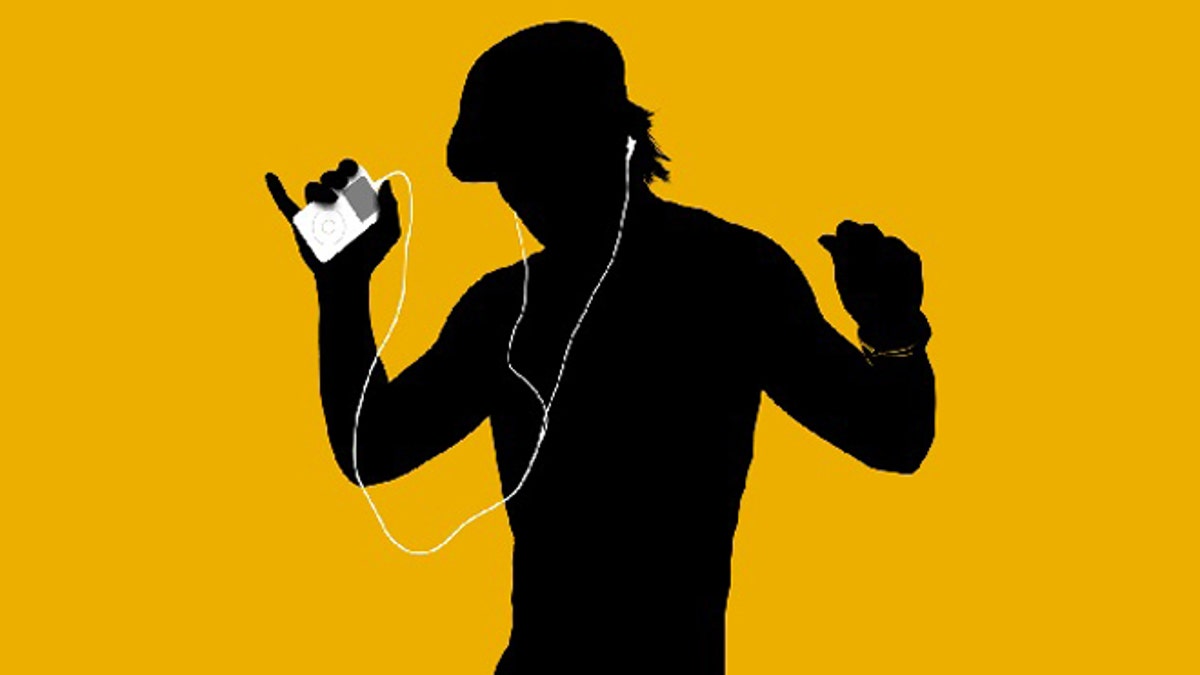
One of a series of early advertisements for Apple's iPod points to the company's deep connections to the music industry -- but will Apple be able to sell a new digital radio service? (Apple)
Turning Apple into cider is a popular sport these days. And Apple is certainly experiencing a lacuna in innovative product introductions (where's the Apple television? where's the Apple watch, when is Apple going to make a better-than-Samsung phone?). Now, the rumor mill is heralding the introduction of Apple radio this summer -- but it may be too little, too late.
Streaming music services are an odd beast in the digital world. Depending on the week, they are the savior of the music business, the devil that will put musicians in the poor house, or they're about to all go bankrupt. Be that as it may, streaming music seems to be the future, from Pandora to Rara, Spotify to Rdio, Rhapsody to Slacker. Also in the music marketplace are services like TuneIn, which gather online feeds from traditional radio stations and Internet-only channels into electronic program guides that let you listen to Tokyo rap or Nigerian classic rock.
'Apple has a lot of catching up to do.'
So unlike when iTunes launched more than a dozen years ago, there's competition aplenty. And since the success of iTunes didn't translate into success for the music companies and artists -- revenues are roughly half of what they were in the 90s -- music execs (and artists) are a lot more skittish about making deals with Apple today.
Still, while disc sales continue to fall -- down 13 percent last year according to Nielsen SoundScan and Nielsen BDS -- and digital track sales are up -- just over 5 percent compared to the previous year -- more of us are relying on streaming services to rock on. Revenues from subscription and ad-supported streaming services grew 59 percent last year from $360 million to $571 million.
Part of the leaked information on Apple's iRadio is that the company wants to play less than everybody else to play: 6 cents per 100 song feeds, versus a rumored 12 cents that Pandora pays and 35 cents than Spotify pays. However, this is comparing Apples to oranges; not every one pays the same people. Some pay artists, others pay labels, for example. And of course, these various leaks are all designed to influence negotiations currently underway, so the truth is far from clear.
What is clear is that any deal that is seen as unnecessarily favorable to Apple would launch a thousand lawyers in music business ships directed at renewed negotiations. Pandora, which has a different arrangement from other music services that deliver specific songs on demand, would surely argue that the rates that it pays through SoundExchange are too high compared to Apple (or more pointedly compared to what Sirius XM pays).
More directly related to Apple's bottom line is the fact that creating another "free" service that relies on advertising would be difficult. It could cannibalize the company's own iTunes song sales faster than you can say Nicki Minaj. And a for-pay subscription service while helping to balance the books is still a niche play. Rhapsody has something on the order of one-sixtieth of Pandora's listeners (depending on how you count them). Most of us still prefer free to subscriptions.
There are also other major players coming to market. Google is said to be working on its own service, and since the company now can brag that it has the world's most popular smart phone platform, it has an obvious advantage in the mobile marketplace. (Incidentally, Android tablets are also projected to surpass iPad shipments this year.)
Aside from cutting deals with record labels, the biggest hurdle Apple faces is reaching listeners. And it cannot do that on its own. It's not about computers and iPods, it's about cars.
"Fifty percent of all radio listening is in the car today," notes TuneIn CEO John Donham. Furthermore, nearly every automaker in the world has connected its cars to online streaming music services, from Aha to Pandora, Porsche to Ford. Getting a music app into a car, however, is not an easy feat.
"The fragmentation in automotive platforms is the largest barrier to entry for tech companies to develop in cars," says Jake Sigal, CEO of Livio, which helps music services and other apps make the connection to automobiles. "Pandora has set the bar since 2008 working with auto companies across multiple mobile devices and automotive platforms," he notes.
So any company that wants to reach car listeners -- or for that matter people listening on smart TVs or Internet connected stereo equipment -- is going to have to cooperate with scores of different manufacturers (including telling them when a new cable connector is going to appear). Playing well with others is not a hallmark of Apple.
On the other hand, there's a new sheriff at Apple and the company has made a lot of smart moves that don't always follow conventional wisdom, such as recently apologizing to Chinese consumers about the company's warranty policies (this was a very intelligent move). And it's impossible to judge an iRadio service until we listen to it. Is it better at making recommendations? Is the sound quality better? Does it have more songs?
TuneIn's Donham, who sees an Apple entry as competing more with the likes of Pandora and Spotify than traditional radio, thinks it could be "potentially a great thing." It will increase consumer awareness of streaming digital music in general and spur adoption. "But Apple has a lot of catching up to do. So it's a story that's going to play out over the next 5 to 7 years," he says.
Follow John R. Quain on Twitter @jqontech or find more tech coverage at J-Q.com.
